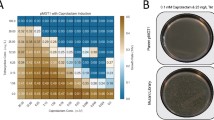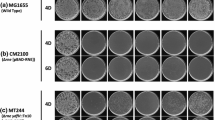Summary
A recombinant plasmid, pMY3, was constructed in this laboratory to express the amber suppressor allele, Su+7, of the tRNATrp gene from E. coli (Yarus, 1979a). This plasmid also relaxes control of the synthesis of all stable RNA species in its host cell after amino acid deprivation. Guanosine penta and tetra-phosphate (MSII and MSI) concentrations are reduced to about one-half the levels achieved by starving the host cells carrying the cloning vehicle (pMB9) alone.
We now show that the relaxation conferred on cells carrying pMY3 can be overcome by at least three different missense mutations at the chromosomal spoT locus. In these stringent, plasmid-carrying strains, the ppGpp levels attained during starvation are equivalent to or higher than that of the host cell carrying the vehicle alone.
In vitro mutagenesis of the relaxing plasmid with EMS, followed by transformation and screening for plasmid-bearing stringent cells, yielded four stringent revertants of the relaxing locus. Cells carrying these mutants plasmids all have normal stringent responses to amino acid starvation, and again, elevate (p)ppGpp levels equal to or greater than 80% LS286 (pMB9) levels.
Despite pMY3′s modest effect on its host's MSI levels during the steady state of starvation, an obvious correlation exists between the concentration of that nucleotide and the host's ability to respond stringently. We therefore believe that the plasmid intervenes in MS metabolism. Measurements of the in vivo rates of decay of MSI and MSII after reversal of isoleucine starvation show that pMY3 has no effect on those reactions. The most likely mechanism of plasmid action is therefore inhibition of MS synthesis.
Similar content being viewed by others
Abbreviations
- MSI:
-
ppGpp
- MSII:
-
pppGpp
- EMS:
-
ethyl methane sulfonate
- TCA:
-
trichloroacetic acid
References
Breeden, L., Yarus, M., Cline, S.: A cloned suppressor tRNA gene relaxes stringent control. Mol. Gen. Genet. 179, 125–133 (1980)
Cashel, M., Gallant, J.: Control of RNA synthesis in E. coli. I. Amino acid dependence of the synthesis of substrates of RNA polymerase. J. Mol. Biol. 34, 317–330 (1968)
Cashel, M., Gallant, J.: Two compounds implicated in the function of the RC gene of E. coli. Nature 221, 838–841 (1969)
Dennis, P.P.: Influence of the stringent control system on the transcription of ribosomal ribonucleic acid and ribosomal protein genes in E. coli. J. Bacteriol. 129, 580–588 (1977)
Fast, R., Sköld, R.: Biochemical mechanism of uracil uptake regulation in E. coli B. J. Biol. Chem. 252, 7620–7624 (1977)
Fiil, N.P., Meyenburg, K. von, Friesen, J.D.: Accumulation and turnover of guanosine tetraphosphate in E. coli. J. Mol. Biol. 71, 769–783 (1972)
Fiil, N.P., Mortensen, U., Friesen, J.D.: Genes involved in magic spot metabolism. In: Alfred Benzon Symposium IX. Control of ribosome synthesis. (N.O. Kjeldgaard and O. Maaløe, ed.) pp. 437–446. Copenhagen: Munksgaard 1976
Fiil, N.P., Willumsen, B.M., Friesen, J.D., Meyenburg, K. von: Interaction of alleles of the relA, relC and spoT genes in E. coli: Analysis of the interconversion of GTP, ppGpp and pppGpp. Mol. Gen. Genet. 150, 87–101 (1977)
Gynheung, A., Justesen, J., Watson, R.J., Friesen, J.D.: Cloning the spoT gene of E. coli: Identification of the spoT gene product. J. Bact. 137, 1100–1110 (1979)
Haseltine, W.A., Block, R.: Synthesis of guanosine tetra- and pentaphosphate requires the presence of a codon-specific, uncharged transfer ribonucleic acid in the acceptor site of the ribosomes. Proc. Natl. Acad. Sci. USA 70, 1564–1568 (1973)
Laffler, T., Gallant, J.: SpoT: A new genetic locus involved in the stringen response in E. coli. Cell 1, 27–30 (1974)
Lindahl, L., Post, L., Nomura, M.: DNA dependent in vitro synthesis of ribosomal proteins, protein elongation factors and RNA polymerase subunit α: Inhibition by ppGpp. Cell 9, 439–448 (1976)
Maaløe, O.: Regulation of the protein-synthesizing machinery-ribosomes, tRNA, factors and so on. In: Biological regulation and development. Vol. I. Gene expression. (R.F. Goldberger, ed.) pp. 487–542. New York: Plenum Press 1979
Miller, J.: In: Experiments in molecular genetics, pp. 431–435. New York: Cold Spring Harbor Laboratory 1972
Nierlich, D.P.: Amino acid control over RNA synthesis: A reevaluation. Proc. Natl. Acad. Sci. USA 60, 1345–1351 (1968)
Nierlich, D.P.: Regulation of bacterial growth, RNA and protein synthesis. Ann. Rev. Microbiol. 32, 393–432 (1978)
Nierlich, D.P., Vielmetter, W.: Kinetic studies of ribonucleotide precursor pools and ribonucleic acid synthesis. J. Mol. Biol. 32, 135–147 (1968)
Pao, C.C., Gallant, J.: A new nucleotide involved in the stringent response in E. coli. J. Biol. Chem. 254, 688–692 (1979)
Parker, J., Watson, R.J., Friesen, J.D., Fiil, N.P.: A relaxed mutant with an altered ribosomal protein L11. Mol. Gen. Genet. 144, 111–114 (1976)
Reiness, G., Yang, H.-L., Zubay, G., Cashel, M.: Effects of guanosine tetraphosphate on cell-free synthesis of Escherichia coli ribosomal RNA and other gene products. Proc. Natl. Acad. Sci. USA 72, 2881–2885 (1975)
Schleif, R.: Control of production of ribosomal protein. J. Mol. Biol. 27, 41–55 (1967)
Somerville, C.R., Ahmed, A.: Mutants of E. coli defective in the degradation of guanosine 5′-triphosphate, 3′-diphosphate (pppGpp). Mol. Gen. Genet. 169, 315–323 (1979)
Sprinzl, M., Wagner, T., Lorenz, S., Erdmann, V.A.: Regions of tRNA important for binding to the ribosomal A and P sites. Biochemistry 15, 3031–3039 (1976)
Wensink, P.C., Finnegan, D.J., Donelson, J.E., Hogness, D.S.: A system for mapping Drosophila melanogaster. Cell 3, 315–325 (1974)
Yarus, M., Knowlton, R., Soll, L.: Aminoacylation of the ambivalent Su+7 amber suppressor tRNA. In: Nucleic acid-protein recognition. (H.J. Vogel, ed.) pp. 391–408. New York. Academic Press 1977
Yarus, M.: Isolation and properties of a plasmid which expresses the E. coli Su+7 amber suppressor tRNA gene. Mol. Gen. Genet. 170, 291–298 (1979a)
Yarus, M., Eisenberg, S.P., Soll, L.: The structure of the DNA containing the E. coli tRNATry gene. Mol. Gen. Genet. 170, 299–308 (1979b)
Yarus, M., Cline, S.W.: The structure of the Ø80d3ilv+su+7 transducing phage and the origin of its Su+7 tRNA-gene containing fragment. Mol. Gen. Genet. 170, 283–289 (1979c)
Yarus, M.: Relaxation of stable RNA synthesis by a plasmid-borne locus. Mol. Gen. Genet. 170, 309–317 (1979d)
Zwaig, N., Lin, E.C.C.: A method for isolating mutants resistant to catabolite repression. Biochem. Biophys. Res. Commun. 22, 414–418 (1966)
Author information
Authors and Affiliations
Additional information
Communicated by L. Lerman
Rights and permissions
About this article
Cite this article
Breeden, L., Yarus, M. Mutations that overcome plasmid-mediated relaxation affect (p)ppGpp. Molec. Gen. Genet. 179, 119–124 (1980). https://doi.org/10.1007/BF00268453
Received:
Issue Date:
DOI: https://doi.org/10.1007/BF00268453




